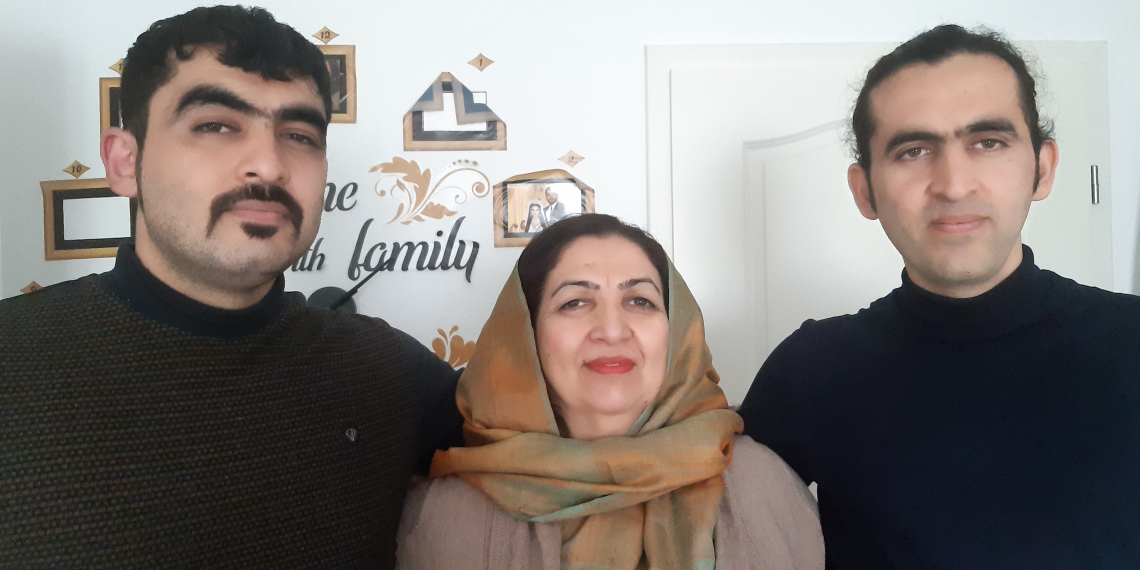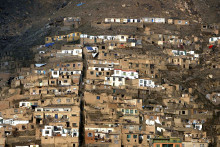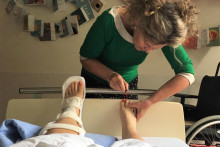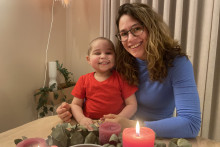In early August, his mother called him from Herat, a large city in western Afghanistan. She told Elias (pictured right) that she planned to fly to capital Kabul because she felt things were going wrong in Herat. Said suspected it would not be so fast and advised against her plan, but she went anyway. Three days later, Herat was in the hands of the Taliban. For security reasons, his father had already fled the country.
Total chaos
Said's mother and brother made it out of Herat just in time, but there was no relief. In record time, capital Kabul fell August 15 as well. 'The two weeks that followed were the worst ever. The first week I didn't work and only watched the news. The Taliban took over the country so quickly that we couldn't prepare anything. At the airport it was total chaos and people were being shot at. During the day my mother and brother hid in a hotel, at night they tried to take a flight, but it didn't work.'
The researcher's parents spent years in Afghanistan working on human rights, especially for women. Work that was paid for by Western countries and completely at odds with the Taliban's beliefs. 'In Herat, at the time of the chaos in Kabul, the Taliban were already killing people in similar positions, or imprisoning them. I'm sure my family was also on those lists. All borders with neighboring countries were closed, so we were all hopeless.'
Science gave me hope, because doing research is what I am good at. That's how I tried to put the situation in Afghanistan out of my mind.
Despite the hopeless situation, Elias tried to stay positive. After a week of following news in front of the television, he picked himself up. 'With the help of my wife, I went back to work on campus. I forced myself to do that because there was nothing I could do. I also got good support from my colleagues. Science gave me hope, because doing research is what I am good at. That's how I tried to put the situation in Afghanistan out of my mind.'
Pakistan
Not much later he received good news. Such good news, he could not and would not believe it. His mother and brother secured plane tickets to Pakistan. 'Overjoyed, they called me, but I couldn't be happy until they were in Pakistan. I was afraid that the Taliban would recognize them as human rights activists. Passing through an airport controlled by a terrorist organization is very dangerous. It took hours before they called again, because all the hotels in Islamabad (the capital of Pakistan, ed.) were full of Afghans and they had no phones anymore. Only after I heard their voices from Pakistan I was relieved.'
I hope that money is not put into weapons, but into knowledge and education. This battle can only be won in the long run.
A week later, his mother and brother landed in Hanover because the German embassy provided quick and good help. Elias visited them there soon after arriving. In Germany, his family is working on formalities, to become German residents. They are also trying to master the German language and looking for rental properties. 'Especially for my parents this is not easy, because they had built a career for years in a completely different country. My brother can adapt more easily, but they are safe, that's the most important thing.'
The researcher hopes that his family will come to Enschede around the holidays, to celebrate them together. They didn't dare dream of that in the summer. It is the first time in four years that the family is complete again. 'If it works out, it will be the most special holidays ever for me. Actually, we were going to celebrate the holidays together in Afghanistan, but that's not going to happen in the next few years. I am very worried about Afghanistan. The Taliban's agenda is unclear, but they are terrorists and they live centuries back in time.'
Science
Elias' hope for 2022 is that as many of his countrymen as possible can leave Afghanistan. In addition, he hopes that the new generation can be saved. Science must be the means of salvation in this. 'I hope that money is not put into weapons, but into knowledge and education. This battle can only be won in the long run. In the corona era we saw what the online possibilities are. We must give the new generation a chance by providing them with education from abroad.'
The scientist describes that as the best weapon in the fight against Taliban philosophy. 'I know what the Taliban wants to teach the youth because I have experienced those lessons myself. That is terrible and not only a danger for Afghanistan, but for the whole world. To stay in terms of corona, it spreads like a virus to other areas and countries. I want to work to provide educational programs for the youngest generation, especially girls, that will give them a chance. That gives me hope.'







